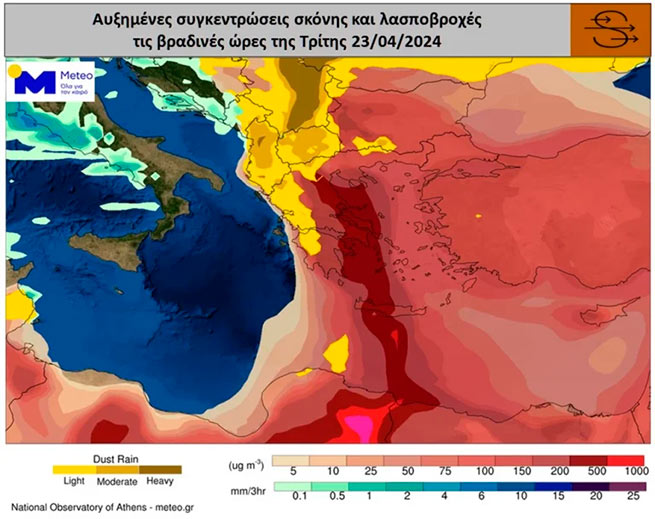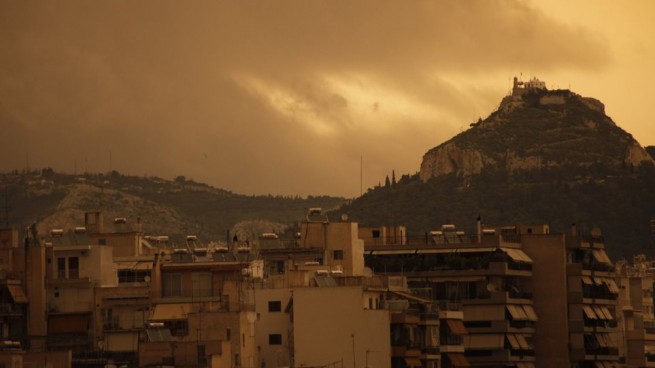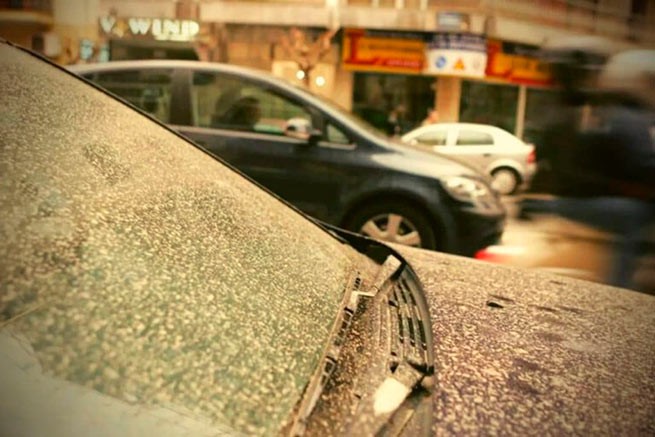Tomorrow, Tuesday 23 April, dust levels from the Sahara are expected to reach their peak in Greece.
According to the forecast from meteo.gr/Athens National Observatory, in addition to very high dust concentrations that will limit visibility, heavy rains are expected, which will occur mainly in the north and west of the country.
On Wednesday, 24/04, a change in wind to the west will lead to a decrease in the amount of dust in the Dodecanese and its gradual removal to the east. Below are the forecast maps:
- Dust concentrations in the atmosphere during the afternoon and evening of Tuesday 23/04 are shown in red.
- Areas where mud rains will occur during the same periods are highlighted in yellow.

Athens news reminds – dust from the Sahara is hazardous to health

The Hellenic Respiratory Society calls on citizens and especially people belonging to vulnerable and sensitive groups to be especially careful. According to the Hellenic Respiratory Society, African dust contains particulate matter that can combine with pollen, bacteria and fungi, creating a highly toxic and dangerous mixture for the human body and especially the respiratory system.
Dust carried from Africa carries toxic substances such as lead, zinc, chromium, vanadium, arsenic and nickel to Greece, the content of which exceeds the maximum permissible (for health) concentration.
This issue causes great concern in the scientific community about the consequences that the transfer of “toxic” African dust will have on human health and the environment, since African dust is currently present throughout Greece, and in addition, a further increase in its quantity is expected in future.

African dust has already been linked to health problems among the Greek population, as it has been noted that on days with high concentrations of dust in the air, hospital admissions of patients suffering from respiratory and heart diseases increase. Among the recommendations of the Lung Association:
- During periods of highest dust concentration, both unnecessary travel and outdoor exercise should be avoided, and it is recommended to stay in well-ventilated areas.
- If clinical symptoms appear, such as, for example, difficulty breathing, a strong and irritating cough with possible expectoration, chest pain, persistent sneezing, watery eyes and gagging, you should immediately seek medical help and advice.
- We strongly recommend that patients suffering from chronic respiratory diseases, such as chronic obstructive pulmonary disease (COPD) and bronchial asthma, if symptoms consistent with an exacerbation or worsening of a stable course of the disease appear, are in constant contact with their doctor for possible modification of medications and obtaining additional medical care.
Vulnerable groups who should be on alert during the spread of African dust:
- Adults and children with allergies,
- Adults and children with breathing problems,
- People suffering from asthma
- Patients with heart disease
- Pregnant women,
- People over 65 years of age.
The National Observatory of Athens has issued a circular instruction for the population so that people themselves can identify dangerous symptoms:
- cough,
- dyspnea,
- discomfort,
- heaviness or pain in the chest,
- wheezing,
- dermatitis,
- headache,
- dizziness.

Those who belong to vulnerable groups should follow the following recommendations:
- Avoid contact with dust (do not leave the house),
- Avoid staying outside, playing sports and active recreation unless necessary,
- Breathe through your nose (so that the air properly penetrates into the nasal cavity and is cleaned in it),
- Wear a protective mask before going outside,
- Those with asthma may need more frequent inhalations of the drug.
If symptoms persist or worsen, you should consult a doctor or healthcare facility.
Dust carried from Africa carries toxic substances such as lead, zinc, chromium, vanadium, arsenic and nickel to Greece, the content of which exceeds the maximum permissible (for health) concentration.
This issue causes great concern in the scientific community about the consequences that the transfer of “toxic” African dust will have on human health and the environment, since African dust is currently present throughout Greece, and in addition, a further increase in its quantity is expected in future.

African dust has already been linked to health problems among the Greek population, as it has been noted that on days with high concentrations of dust in the air, hospital admissions of patients suffering from respiratory and heart diseases increase. Among the recommendations of the Lung Association:
- During periods of highest dust concentration, both unnecessary travel and outdoor exercise should be avoided, and it is recommended to stay in well-ventilated areas.
- If clinical symptoms appear, such as, for example, difficulty breathing, a strong and irritating cough with possible expectoration, chest pain, persistent sneezing, watery eyes and gagging, you should immediately seek medical help and advice.
- We strongly recommend that patients suffering from chronic respiratory diseases, such as chronic obstructive pulmonary disease (COPD) and bronchial asthma, if symptoms consistent with an exacerbation or worsening of a stable course of the disease appear, are in constant contact with their doctor for possible modification of medications and obtaining additional medical care.
Vulnerable groups who should be on alert during the spread of African dust:
- Adults and children with allergies,
- Adults and children with breathing problems,
- People suffering from asthma
- Patients with heart disease
- Pregnant women,
- People over 65 years of age.
The National Observatory of Athens has issued a circular instruction for the population so that people themselves can identify dangerous symptoms:
- cough,
- dyspnea,
- discomfort,
- heaviness or pain in the chest,
- wheezing,
- dermatitis,
- headache,
- dizziness.

Those who belong to vulnerable groups should follow the following recommendations:
- Avoid contact with dust (do not leave the house),
- Avoid staying outside, playing sports and active recreation unless necessary,
- Breathe through your nose (so that the air properly penetrates into the nasal cavity and is cleaned in it),
- Wear a protective mask before going outside,
- Those with asthma may need more frequent inhalations of the drug.
If symptoms persist or worsen, you should consult a doctor or healthcare facility.







More Stories
Thodoris Kolidas explains the phenomenon "black sky" on Good Friday
Black swan in the Evros river delta
The weather will turn bad on Good Friday